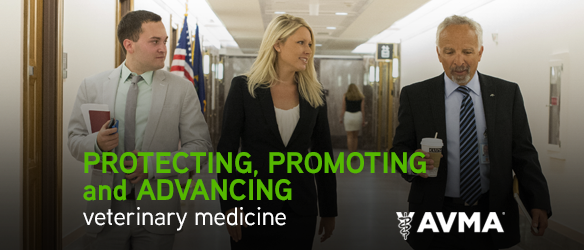Farm bill delivers victory for veterinary medicine
 The nation’s new farm bill creates critical programs to improve animal health and enhance the nation’s ability to prevent and respond to animal disease outbreaks. The AVMA worked with animal agriculture groups to make sure these programs were in the bill, and their inclusion is a significant win for veterinary medicine.
The nation’s new farm bill creates critical programs to improve animal health and enhance the nation’s ability to prevent and respond to animal disease outbreaks. The AVMA worked with animal agriculture groups to make sure these programs were in the bill, and their inclusion is a significant win for veterinary medicine.
Of particular importance to veterinarians, the bill includes a proactive, three-pronged approach to animal disease:
- A new National Animal Disease Preparedness and Response Program
- Enhanced resources for the existing National Animal Health Laboratory Network (NAHLN)
- A new National Animal Vaccine and Veterinary Countermeasures Bank, a national livestock vaccine bank with immediate attention to foot-and-mouth disease
These three programs will work together to help veterinarians and the animal agriculture industry prevent and more quickly respond to animal disease outbreaks.
For instance, the National Animal Disease Preparedness and Response Program will provide funding for animal disease prevention and mitigation, and help coordinate between U.S. Department of Agriculture officials and on-the-ground veterinarians during outbreaks. The increased funding for the NAHLN will allow the network’s laboratories to rapidly identify diseases, helping veterinarians respond quickly. The livestock vaccine bank will complement these programs by providing necessary resources in case of a foot-and-mouth disease outbreak, and others as it is expanded.
In total, we secured $150 million for these programs over the next five years. While we believe more funding is ultimately required to optimize their effectiveness, the bill provides much-needed funds for these vital provisions:
- $20 million for the National Animal Disease Preparedness and Response Program over fiscal years 2019-2022
- An additional $100 million for 2019-2022, to be divided among the three programs
- Permanent funding of $18 million a year for the National Animal Disease Preparedness and Response Program beginning in 2023, plus an additional $12 million a year for the three programs combined
Additionally, the authorized funding level for the National Animal Health Laboratory Network is doubled from the previous $15 million, and is now $30 million a year. This makes the laboratories eligible to receive additional funds up to that same amount. Lawmakers also made the animal disease program and vaccine bank eligible for additional funds, but did not specify an amount.
The bill also funds important research initiatives for animal health, such as research grants through the Agriculture and Food Research Initiative to study cattle fever ticks, chronic wasting disease, and more.
Animal welfare and cannabis provisions in the farm bill
The farm bill also contains animal welfare provisions, including one that extends prohibitions on animal fighting to U.S. territories. A modified Pet and Women Safety Act (PAWS Act) was passed as part of the farm bill, expanding federal domestic violence protections to include protections for victims’ pets, and certain other animals. The bill maintains horses’ legal definition and status as livestock, which AVMA supported to maintain important precedents in other areas of law.
Also of interest to veterinarians, the bill exempts industrial hemp – defined as Cannabis sativa L. and its derivates containing less than 0.3% of the psychoactive component known as THC – from the Controlled Substance Act. This means cannabis and its derivatives meeting this very low concentration of THC will no longer be considered Schedule I controlled substances – although those with higher THC concentrations will remain in that category. This has implications for the potential use of these products for a variety of purposes. However, the bill explicitly says this change does not affect regulation of these products under the Federal Food, Drug, and Cosmetics Act, or the status of those products marketed with therapeutic label claims. The Food and Drug Administration has issued a statement on this topic and said it will host a public meeting to receive stakeholder input.
AVMA members played a key role in ensuring that important animal health priorities were included in the farm bill. From our 2018 fly-in to dozens of in-district meetings between veterinarians and members of Congress, grassroots support by AVMA members helped deliver this legislation. AVMA’s advocacy work in Washington and media outreach also educated lawmakers on why these programs are important and necessary.
The AVMA Government Relations Division has put together a summary outlining many of the farm bill’s key provisions for veterinary medicine. This includes highlights of certain changes in law that could impact veterinarians or veterinary practice.


Comments
Add New Comment